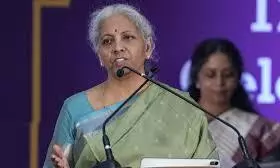
GST reforms will make economy transparent, says Nirmala Sitharaman
text_fieldsUnion Finance Minister Nirmala Sitharaman on Tuesday said the upcoming GST reforms would make India’s economy more transparent while easing compliance for small businesses.
She was speaking at the 120th Foundation Day celebrations of Tamil Nadu-based City Union Bank, where President Droupadi Murmu was the chief guest.
Sitharaman said Prime Minister Narendra Modi had recently announced the creation of a Task Force for next generation reforms. The panel has been given a clear mandate to simplify regulations, lower compliance costs, and support startups, MSMEs, and entrepreneurs.
“Complementing this, the planned roll out of the next generation GST reforms with the planned Council meeting tomorrow and day after, will set an economy absolutely open and transparent in the coming months and with further reduction in compliance burden, making it easier for small businesses to thrive,” she said.
In his Independence Day address, PM Modi had announced big-ticket GST reforms and promised a Diwali bonanza for citizens.
Speaking on the role of banks, Sitharaman said India’s progress towards its vision of Viksit Bharat 2047 required banks to expand credit, finance infrastructure, support MSMEs, and bring the unbanked into the formal banking system. “The guiding principles for this transformation must be trust, technology and transparency,” she noted.
She highlighted that over the past 11 years, 56 crore Jan Dhan accounts had been opened with deposits of ₹2.68 lakh crore, with the majority of account holders being women. She added that Indian scheduled commercial banks have shown a sharp improvement in asset quality, reported PTI.
According to her, Gross NPAs of Scheduled Commercial Banks fell to 2.3% as of March 31, 2025, while net NPAs dropped to 0.5%. “I would think, at a time which is so challenging as this, our banks to achieve this is phenomenon and all Indian banking sector members, families, employees, the Board will have to get our due recognition for the wonderful service they have done,” she said.
She added that the strong balance sheets meant aggregate capital levels would remain above regulatory minimums even in “adverse stress scenarios.” “So, strong and well capitalised banks with a near record low NPAs mean cheaper, steadier credit for households, MSMEs and infrastructure, lower systemic risks and also sustained confidence in India's financial system,” she said.
On the economy, the minister pointed out that GDP grew 7.8% in the April–June 2025 quarter, surpassing expectations. Inflation has declined for nine straight months and touched an eight-year low of 1.55% in July 2025, she said.
Employment numbers also showed strength. As of June 2025, the Employees’ Provident Fund Organisation recorded a net addition of nearly 22 lakh members, the second consecutive month of record gains.
Quoting an IIM Bengaluru study, Sitharaman said the Pradhan Mantri Jan-Dhan Yojana helped protect financial savings and proved valuable during the COVID-19 crisis. “Bank account is not just a passbook. It is a passport to opportunities enabling access to credit, savings, insurance, and dignity,” she said.
She also praised City Union Bank for its continued focus on MSME lending, retail and wholesale trade, and agriculture. She said its work reflected the principle that “finance must support growth at the grass root level.”
Sitharaman emphasised that banks should advance India’s growth by adhering to the principles of trust, technology, and transparency. She said, “Trust is earned through consistent service of ethical conduct and sound governance. It is very important for the banks to earn and retain trust.”
Technology, she added, must be used for efficiency, inclusion, and customer empowerment. Transparency, she said, must ensure that every rupee contributes to nation-building.












